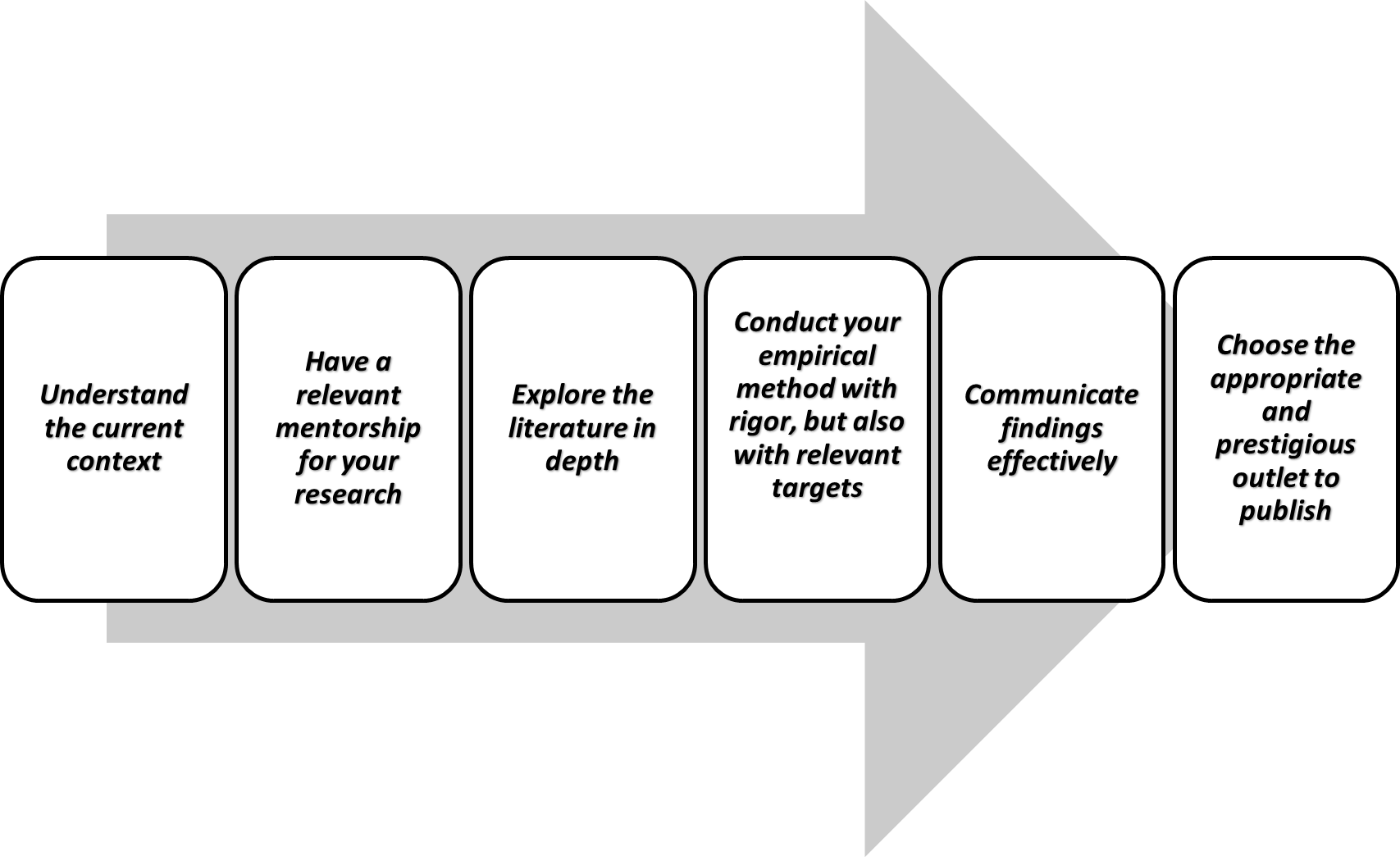Author: Prof. Guilherme F. Frederico, School of Management, Federal University of Paraná, Curitiba, Brazil
Research in operations and supply chain management (O&SCM) has gained relevant attention from researchers in the last years, especially due to the recent phenomena like disruption events, climate issues, and wars, which evidenced the importance of supply chains for operations continuity of several industry sectors.
All those events aligned with the trends of Industry 4.0 and 5.0 and sustainable and circular supply chains, have driven and fostered many studies in the field of O&SCM. Despite growing studies in this field, there is a huge expectation regarding how impactful this research will be in practice and to society. Designing research is always a challenging task, irrespective of the impact that may be generated. However, to craft promising studies in O&SCM that aims to generate real impact for theory, practice, and society, requires that some elements and steps be taken into consideration. This opinion piece considers some six steps to consider when designing and conducting impactful research in O&SCM.
1. Understand the current context
When crafting research in O&SCM, it is crucial to consider the current context. This may involve for instance geopolitical and economic issues, cultural aspects, technological advancements, among others. In addition to addressing research gaps in face of the extant literature, researchers should be able to look at these contextual elements and shape their research questions, hypotheses, and research framework, asking how they are relevant to the conjunctural scenario. Consider how the research findings are going to be able support the contextual current issues by fostering more research (theoretical implications), solving practical issues (practical implications) and helping on society development (societal implications).
2. Have a relevant mentorship for your research
Having crafted the initial scope, it becomes paramount that researchers seek a relevant mentor in the field, especially initial and mid-career researchers. When sharing and asking for ideas, your mentor will challenge you to think out of box and include elements that you haven’t initially considered. This will elevate your research design to be more assertive and impactful.
3. Explore the literature in depth
To understand what is relevant and impactful, you need to explore the literature in depth using the main research databases. Systematic literature review (SLR) method is paramount to identify gaps, especially on the theoretical side. Also, the results of your SLR will provide you with the basis for your empirical study (e.g. constructs and variables for survey research; dimensions and questions for the research protocol in case studies). The SLR itself can be even impactful in some situations, especially for recent trends and phenomena by unveiling constructs and their relations related to the subject, showing a framework which will foster new studies (theoretical impact), practices, and guidance application (practical and societal impact).
4. Conduct your empirical method with rigor, but also with relevant targets
Pursuing rigor by assuring validity, reliability, and replicability in O&SCM research is fundamental to its robustness. However, even if the applied methodology follows all those aspects, it may be possible that you have not sought the relevant targets. That means you have not researched with relevant analysis units, respondents, and interviewees related to the subject you are investigating. For instance, have you thought about your case study’s worst- or best-case scenarios (depending on the orientation you are looking for to investigate)? Have you considered a broad, diverse, and best sample of experts for your survey research? You need to think about how relevant the inputs will be from the target you are seeking, and if they are capable of providing theoretical, practical and societal insights, according to your research purpose and the impact you want to bring about.
5. Communicate findings effectively
It is usual to see very robust research in terms of design and method application in O&SCM, but that research can fail on presenting insights in an effective way. Sometimes, some research gives more emphasis on the methodology demonstration, which is relevant, but it is not able to show in a summarised and clear way what the real implications are in terms of theory, practice, and society. So, if you want your research to be impactful, you need to be able to effectively demonstrate your findings. This is perhaps the most important part of your research because it is where readers will search for insights. These readers are researchers, policymakers, decision-makers, practitioners who are seeking answers, guidance, and applications. They are the people who can generate the real impact of your research, by using it for different purposes.
6. Choose an appropriate and prestigious outlet for publication
Finally, the publication strategy of your research is a paramount step to make your research more impactful. This is because readers in general will seek certain subjects in related and specialised journals. Then, you must consider what is the most appropriate journal for your research. This cannot be only a convenience process. Usually, this is clear in the Journal’s scope, but contacting the editorial office of the journal may also be a useful strategy. Seeking prestigious and well-established publishers will provide visibility and credibility for your manuscript, contributing to the impact pathway.
Figure 1 synthetises the six elements and steps to craft impactful research in O&SCM.

Figure 1 Crafting impactful research in O&SCM
The elements and steps described are not exhaustive and depending on the type of subject and context that the research is related to, more elements and steps may need to be followed. However, this perspective brings out an encouragement to researchers to think about and plan impact during the crafting process of their research, going beyond the perspective of waiting to see if the communicated research will or will not generate posteriori impact.
About the author

Guilherme F. Frederico, PhD is a Professor of Operations, Supply Chain and Project Management at School of Management - Federal University of Paraná – UFPR – Brazil and Visiting Research Professor of Centre for Supply Chain Improvement at University of Derby - UK. He is the author of the Book “Operations and Supply Chain Strategy in the Industry 4.0 Era” and has published articles in the relevant international journals (e.g. Supply Chain Management an international journal, Benchmarking an international journal, International Journal of Logistics Management, Business Process Management Journal, Operations Management Research), conferences (e.g. IEOM, POMS), and magazines (Supply Chain Management Review, Logistics Management, Performance Magazine, The World Financial Review).
Prof. Frederico is also an area editor of the Operations Management Research Journal – OMR – Springer, Member of the Editorial Board of Computers and Industrial Engineer – Elsevier and International Journal of Industrial Engineering and Operations Management - Emerald. His research interests are related to Supply Chain 4.0, Industry 4.0, Maturity in Supply Chain and Operations Management, Performance Measurement in Supply Chains, Knowledge and Information Management and Supply Chain and Operations Strategy. Prof. Frederico is more than 20 years’ experienced on Supply Chain and Operations Management having also been worked in strategic positions of global companies of manufacturing and services Industry.

Quality education for all
We believe in quality education for everyone, everywhere and by highlighting the issue and working with experts in the field, we can start to find ways we can all be part of the solution.
